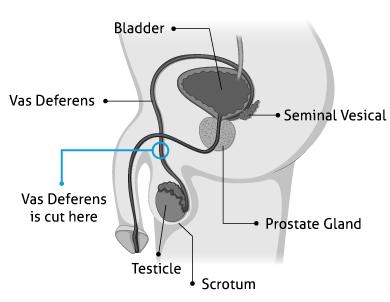
Is a vasectomy right for you?
Vasectomy is a simple, safe procedure that makes a man unable to father a child (sterile). It is the most effective birth control method for men. Having a vasectomy is a serious step. You and your partner should understand all the facts and share in the decision.
Having a vasectomy should be considered a permanent decision. Many men choose a vasectomy because their families are already
complete. Others, because it’s more reliable than other birth control methods. There are important questions you should ask yourself. Is there any circumstance that might make you change your mind? For instance, if you entered a new relationship, would you want more children? If you decide to have a vasectomy, you and your partner should have no doubts.
Facts about Vasectomy
- A vasectomy does not affect your ability to have sex, erections or orgasms. You’ll still be able to enjoy sex. It also doesn’t visibly change your semen.
- A vasectomy does not cause health problems. You may have heard that a vasectomy causes health problems such as prostate cancer or heart disease. Recent medical studies say this is not true.
- A vasectomy will not protect you against sexually transmitted diseases (STDs).
- A vasectomy does not reduce your sex drive. After a vasectomy, your male hormone levels remain the same. Your sex drive, hair distribution and the pitch of your voice won’t change.
- A vasectomy will not solve sexual or relationship problems. It’s also not a decision to make during times of stress.
During the procedure

You’ll be asked to undress and lie on a table. To prevent pain during surgery, you’ll be given an injection of local anesthetic in your scrotum or lower groin. Once the area is numb, one or two small incisions are made in the scrotum. The vas deferens are lifted through the incision and cut. The ends of the vas are then sealed off. If needed, the incision is closed with stitches. The entire procedure usually lasts 30-45 minutes. Once it is over, you can rest until you’re ready to go home.
Recovering at Home
For about a week, your scrotum may look bruised and slightly swollen. You may also have a small amount of bloody discharge from the incision. This is normal. To help make your recovery more comfortable, follow these tips.
- Elevate your feet for the first 12-24 hours. Limit your activity for 48 hours or until you feel better
- Place an ice pack on groin area as much as tolerated the first 48 hours
- Wear briefs for comfort
- Take medications with acetaminophen (such as Tylenol) to relieve any discomfort
- You may have intercourse when comfortable
- Some swelling and bruising is expected
- Call for bleeding, severe pain or other concerns
After the procedure – Semen Analysis
The procedure is not considered to be complete until you have a “zero” sperm count.
A semen analysis is performed to confirm sterilization. Sperm is usually clear from the semen in 8-12 weeks following significant “activity” to clear the sperm. Have your post-vasectomy semen analysis/sperm count at that time. Postpone the sperm count if you have not been “active.”
A vasectomy procedure includes the evaluation of small tissue samples by the Allina Health Central Reference Lab in Minneapolis.
Bring a semen sample in the specimen container within 1-2 hours after ejaculation. Take the sample to any of our clinic labs Monday through Friday 8:00 am until 4:00 pm. No appointment is necessary.
Other Birth Control Methods
Before deciding on a vasectomy, you and your partner should consider other methods of birth control. Ask your provider for more information.
IMPORTANT - You still need to use contraception until a semen analysis shows that no sperm are present.
Possible Risks and Complications
Vasectomy is a safe procedure. But it does have risks, including bleeding and infection. You may also have any of the following after surgery.
- Spermatic granuloma - This is a small harmless lump that may form where the vas deferens is sealed off.
- Sperm buildup - This may cause soreness in the testes. Anti-inflammatory medication can provide relief.
- Epididymitis - This is an inflammation that may cause scrotal aching. This often goes away without treatment. Anti-inflammatory medications can provide relief.
- The vas deferens can reconnect in rare cases. This makes you fertile again and can result in unwanted pregnancy.
- Sperm antibodies are a common response of the body to absorbed sperm. The antibodies can make you sterile, even if you later try to reverse your vasectomy.
- Long-term testicular discomfort may occur after surgery, but it is very rare.
